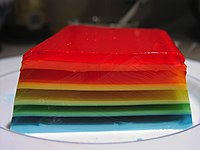
Photo from wikipedia
BACKGROUND Turkey skin, a byproduct of poultry processing, contains a significant amount of collagen that might be used to make non-mammal gelatin. However, gelatin production from turkey skin has not… Click to show full abstract
BACKGROUND Turkey skin, a byproduct of poultry processing, contains a significant amount of collagen that might be used to make non-mammal gelatin. However, gelatin production from turkey skin has not yet been investigated. The purpose of this research is to figure out the optimum gelatin extraction conditions from turkey employing the central composite design (CCD) and response surface methodologies (RSM). The independent factors such as temperature (50, 60, and 70 °C) and time (5, 7, and 9 h) were optimized for three response variables, namely yield, gel strength, and foam expansion (FE). RESULTS With R2 values of 0.8576 for yield, 0.8386 for gel strength, and 0.9283 for foam expansion, linear, quadratic, and respective models were used. The yield, gel strength, and FE actual values were found to be 15.36%, 396.61 g, and 40%, respectively. The optimum extraction conditions were found to be 62.90 °C for 6.84 h. The foam stability, L, and b values were significantly impacted by temperature and extraction time (p < 0.05). CONCLUSIONS The gel strength value of the gelatin extracted under optimal conditions was higher than that of commercial bovine. The findings of this investigation showed that turkey skin is a suitable raw material for the manufacturing of gelatin. This article is protected by copyright. All rights reserved.
Journal Title: Journal of the science of food and agriculture
Year Published: 2023
Link to full text (if available)
Share on Social Media: Sign Up to like & get
recommendations!